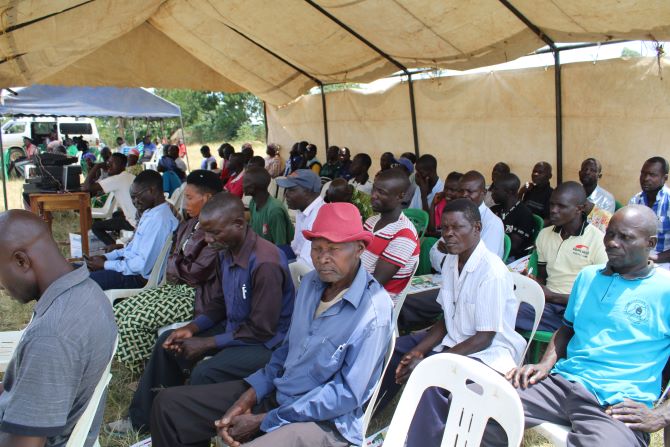NEBBI, March 18, 2024 – The rampant land fragmentation and land conflicts in Erussi Sub-county, Nebbi district are affecting productivity and causing food insecurity.
According to the district authorities, Erussi Sub-county which has been a food basket for the West Nile region is now grappling with food insecurity due to the increased land fragmentation and land conflicts.
Speaking during the launch of the Land Rights camp over the weekend organised by the Eastern African Small Scale Farmers Forum [ESAFF] at Erussi Sub-county, Collins Orom Jalacida, the sub-country Chairperson disclosed that land fragmentation has led to land conflicts.
Orom said his sub-county now produces less than 50 percent of food it used to produce due to land fragmentation and land conflicts.
“Every year at least one person is killed in a land conflict. Many women are denied access to land and because of the land conflicts, so many of our women have been pushed out of agricultural production and yet 80 percent of the agricultural work is done by the women,” Orom said.
“In our culture when a husband dies and leaves a widow behind with orphans, most of these widows are always denied access to land because when leaders are dividing the land, women are not prioritised,” he added.
Scovia Jungiela, a resident of Acwera Village Padolo parish confirmed that she is a victim of the land fragmentation, and she has not been allocated any land by her parents or her in-laws.
“I have two children but I only have one acre of land, so even if I have an interest in growing more food, I don’t have enough land. I am a single mother who has only one acre of land to grow food,” Jungiela said.
Another resident of Ulenyi villages, Padolo parish in Erussi sub-county, Charity Amia said: “My father did not allocate me any land. my brothers told me I don’t have a share of of the family land. That is why I am doing small business at the trading centre for survival.”
Kelvine Adubango of Joel Cox Advocates notes that land conflict are not only in Erussi Sub-county but also are prevalent other sub-counties of Nebbi district, with many cases registered in court.
“Every year, we handle more than 1000 cases of land conflict in Nebbi, and the majority of the cases are involving families. Some of these cases have been referred for mediation, others have gone to court,” Adubango said.
The Nebbi district LCV Chairperson, Emmanuel Orombi observed that due to the land fragmentation and the land conflicts, farmers who could transform to commercial farming have been dealt a big blow.
“There have been challenges in our district when it comes to land use. Many of our people want to sell land instead of using the land for commercial production,” the district chairperson said.
The Nebbi Resident District Commissioner, Robert Abak said his office, although is not mandated to solve land conflicts, on average mediates in five land issues a month but also organises community dialogues on land matters.
The interventions to end the land conflict
ESAFF is helping to solve land conflicts using the Gender Action Learning System [GALS] methodology which uses participatory processes that enable members to negotiate their needs and interests to find gender-equitable solutions in their households.
According to Ronald Bagaga, the Policy and Advocacy Officer at ESAFF, the organisation in partnership with the Ministry of Land Housing and Urban Development started the Land Rights Camp to secure land rights for the vulnerable so that they engage in socio-economic development.
“We are implementing the Land Rights Camp in the districts of Arua, and Nebbi, intending to handle critical land-related issues, and we are targeting more than 1,000 beneficiaries. We are happy that we managed to reach 50 percent of the beneficiaries as women,” Bagaga said.
Jimmy Ochom, the land rights Advisor at Oxfam Uganda, one of the partners supporting the Land Rights Camp stated that all is geared towards ending the rampant land conflicts in the greater Alur Sub-region by empowering the communities to acquire certificates for their customary land.
Local efforts to end the land fragmentations and land conflicts
The district Chairperson Nebbi, Emmanuel Orombi said the district is putting in place local measures including sensitisation of the community on land rights, empowering the Local Council One chairpersons, and building the capacity of the area land committees and the district land committees through trainings.
“We have just last week trained the district land committees and we want them to expedite the process of land registration, and ensure every two months they issue certificates of customary ownership,” Orombi said.
According to Kelvine Adubango of Joel Cox Advocates, through the partnership with the district local governments and other partners, lawyers who hail from the Alur Sub-region are providing pro-bono services.
What cultural leaders are doing?
In 2020, the Alur King Philip Olarker Rauni III launched a campaign that was aimed at advocating for land rights where both women and men can use land to improve their livelihoods without having to divide it amongst themselves.
The Constitution on land ownership
The constitutional right to own land under Article 237[1] of the Constitution clearly states that land belongs to citizens of Uganda and Article 21 prohibits discrimination based on gender and accords men and women the same status and rights.
https://thecooperator.news/minister-nabakooba-cautions-oyam-against-land-fragmentation/
Buy your copy of thecooperator magazine from one of our country-wide vending points or an e-copy on emag.thecooperator.news
